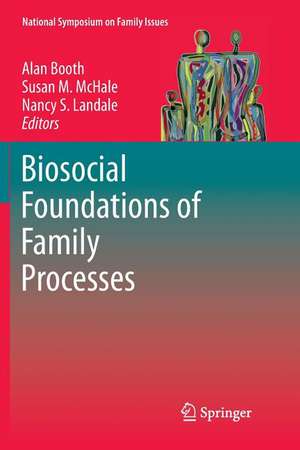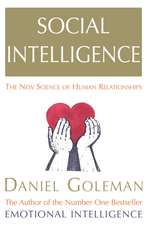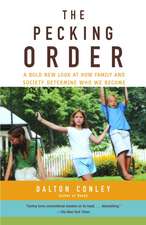Biosocial Foundations of Family Processes: National Symposium on Family Issues
Editat de Alan Booth, Susan M. McHale, Nancy S. Landaleen Limba Engleză Paperback – 25 ian 2013
| Toate formatele și edițiile | Preț | Express |
|---|---|---|
| Paperback (1) | 640.06 lei 43-57 zile | |
| Springer – 25 ian 2013 | 640.06 lei 43-57 zile | |
| Hardback (1) | 646.30 lei 43-57 zile | |
| Springer – 10 dec 2010 | 646.30 lei 43-57 zile |
Preț: 640.06 lei
Preț vechi: 753.01 lei
-15% Nou
Puncte Express: 960
Preț estimativ în valută:
122.51€ • 133.12$ • 102.98£
122.51€ • 133.12$ • 102.98£
Carte tipărită la comandă
Livrare economică 21 aprilie-05 mai
Preluare comenzi: 021 569.72.76
Specificații
ISBN-13: 9781461427810
ISBN-10: 1461427819
Pagini: 288
Ilustrații: XVI, 272 p.
Dimensiuni: 155 x 235 x 15 mm
Greutate: 0.41 kg
Ediția:2011
Editura: Springer
Colecția Springer
Seria National Symposium on Family Issues
Locul publicării:New York, NY, United States
ISBN-10: 1461427819
Pagini: 288
Ilustrații: XVI, 272 p.
Dimensiuni: 155 x 235 x 15 mm
Greutate: 0.41 kg
Ediția:2011
Editura: Springer
Colecția Springer
Seria National Symposium on Family Issues
Locul publicării:New York, NY, United States
Public țintă
ResearchCuprins
I. Parenting and Early Childhood Behavior and Development.- How Mothers Are Born: A Psychobiological Analysis Of Mothering.- How Fathers Evolve: A Functional Analysis Of Fathering Behavior.- Caregiving As Co-Regulation: Psychobiological Processes And Child Functioning.- The Determinants of Parenting in GXE Perspective: A Case of Differential Susceptibility.- II. Development and Adjustment in Adolescence.- Gene-Environment Interplay Helps To Explain Influences Of Family Relationships On Adolescent Adjustment And Development.- The Importance of the Phenotype in Explorations of Gene-Environment Interplay.- The Importance of Puberty in Adolescent Development.- Genes, Hormones, and Family Behavior: What Makes Adolescence Unique.- III. Mate Selection, Family Formation, and Fertility.- Human Adaptations for Mating: Frameworks for Understanding Patterns of Family Formation and Fertility.- The Need for Family Research Using Multiple Approaches and Methods.- Psychological Adaptation and Human Fertility Patterns: Some Evidence of Human Mating Strategies as Evoked Sexual Culture.- Comments on Consilience Efforts.- IV. Family Adaptations to Resource Disparities.- Family Influences on Children’s Well-Being: Potential Roles of Molecular Genetics and Epigenetics.- Social Inequalities, Family Relationships, and Child Health.- Family Resources, Genes, and Human Development.- In Search of GE: Why We Haven’t Documented a Gene-Social Environment Interaction Yet.- A Promising Approach to Future Biosocial Research on the Family: Considering The Role of Temporal Context.
Textul de pe ultima copertă
Genes and environment. Biology and behavior. Nature and nurture. The terminology may be clear-cut, but the processes themselves are far from simple: unlike the direct cause-and-effect dichotomies of past frameworks, researchers now recognize these family-based connections as multifaceted, transactional, and emergent.
Biosocial Foundations of Family Processes aims at illuminating a multiplicity of approaches and methodologies for studying family dynamics, to match the complex interplay of physiological factors, environmental challenges, and behavioral adaptations that characterize family life and development. Chapters illustrate physical and social influences on parenting, childhood, adolescence, fertility, and family formation, providing analytical frameworks for understanding key areas such as family behavior, health, development, and adaptation to contextual stressors.
Highlights of the coverage:•Motherhood and fatherhood as seen through psychobiological and functional perspectives•The importance of the phenotype in studies of gene/environment interactions•Adolescence: genes, hormones, and family behavior•Psychological adaptation and human mating strategies•Family resources, genes, and human development•Social inequities, family relationships, and child health
A book that explains the present while charting the future study of its subject, Biosocial Foundations of Family Processes is provocative reading for researchers in family relations, family sociology, psychology, and public health, and may hold particular interest for policymakers.
Biosocial Foundations of Family Processes aims at illuminating a multiplicity of approaches and methodologies for studying family dynamics, to match the complex interplay of physiological factors, environmental challenges, and behavioral adaptations that characterize family life and development. Chapters illustrate physical and social influences on parenting, childhood, adolescence, fertility, and family formation, providing analytical frameworks for understanding key areas such as family behavior, health, development, and adaptation to contextual stressors.
Highlights of the coverage:•Motherhood and fatherhood as seen through psychobiological and functional perspectives•The importance of the phenotype in studies of gene/environment interactions•Adolescence: genes, hormones, and family behavior•Psychological adaptation and human mating strategies•Family resources, genes, and human development•Social inequities, family relationships, and child health
A book that explains the present while charting the future study of its subject, Biosocial Foundations of Family Processes is provocative reading for researchers in family relations, family sociology, psychology, and public health, and may hold particular interest for policymakers.
Caracteristici
Leading researchers address the critical interface of biology and society Focuses on child development through adolescence Includes the most up-to-date genetic research
























